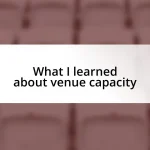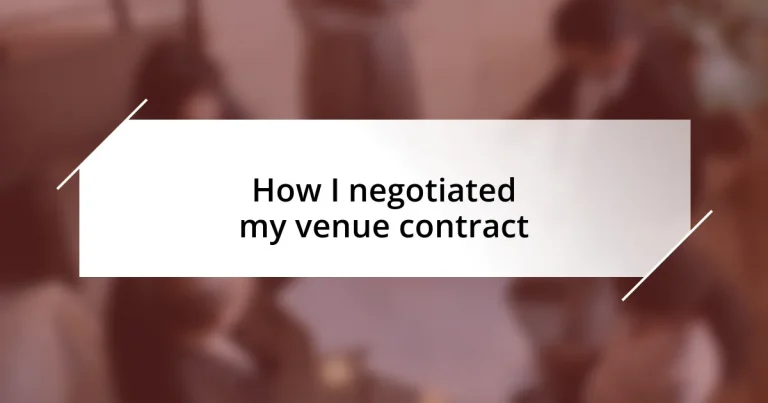Key takeaways:
- Understanding key components of venue contracts, such as deposits and cancellation policies, is essential for budget management.
- Preparation for negotiations, including research and creating a list of priorities, boosts confidence and effectiveness.
- Building rapport with venue managers through genuine conversation can transform negotiations into a collaborative effort.
- Reviewing final contract details thoroughly ensures all key elements are understood and can prevent potential issues later.
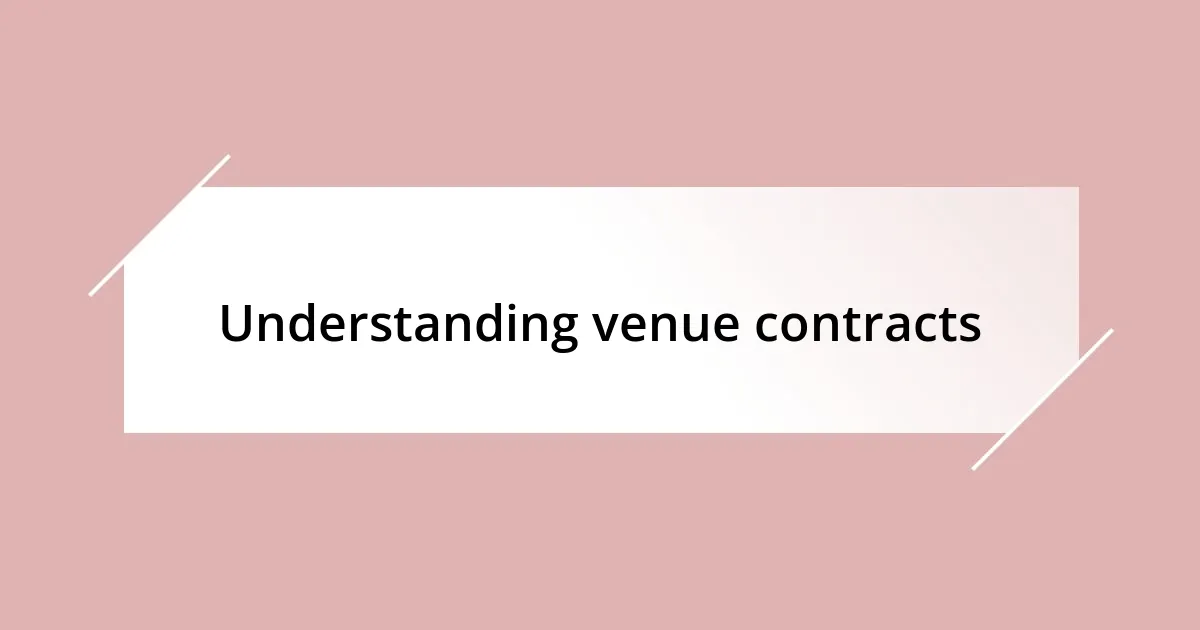
Understanding venue contracts
Venue contracts can be a maze of legal jargon, but understanding the key components is crucial for a successful event. I remember feeling overwhelmed when I first looked at a venue contract; it felt like I needed a degree in law just to decipher the terms! Did you know that the deposit, cancellation policy, and payment schedule are the cornerstones? These elements can make or break your event budget and peace of mind.
When I negotiated my last venue contract, I realized that flexibility is key. I discovered several clauses that listed penalties if I needed to alter the guest count or reschedule. It made me wonder—how many people overlook these details? Being aware of these small print intricacies can save you stress and unexpected costs down the line.
One aspect I found particularly helpful was the timeline outlined in the contract. It laid out everything from setup to breakdown, which gave me clarity and confidence. Have you ever felt lost in the logistics? Having a clear timeline not only keeps your event on track but also allows you to communicate effectively with your team. Understanding these elements can transform a daunting contract into a manageable roadmap for your event.
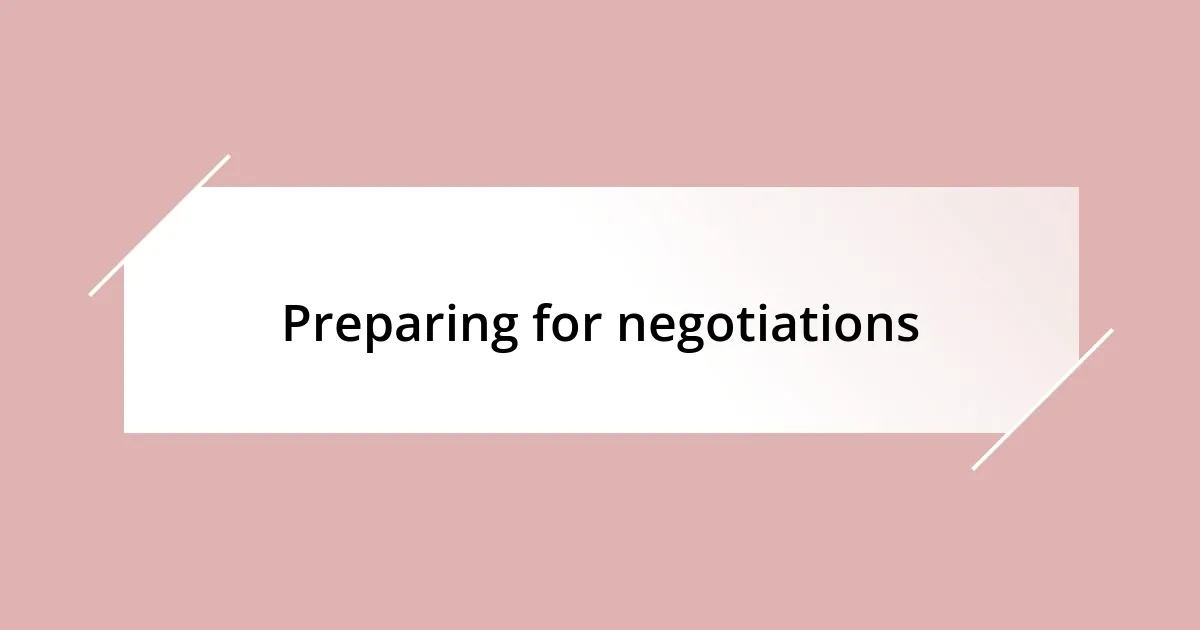
Preparing for negotiations
Preparing for negotiations requires a mix of research and self-awareness. I remember sitting down at my kitchen table, surrounded by notes, researching every detail about the venue and its past clients. What struck me was how informative online reviews can be. They provided insights not only about the venue but also about the flexibility of the staff, which is invaluable when it comes to negotiations.
Next, I created a list of my must-haves and deal-breakers. This was a game-changer! By prioritizing what was most important to me, I felt empowered during the negotiation. I distinctly recall offering more flexibility on my end with the delivery times in exchange for better catering options. It felt great to trade something I wasn’t too concerned about for something that truly mattered.
Don’t forget to practice your negotiation skills beforehand. I went through several mock negotiations with a friend, specifically focusing on handling objections calmly. It made a world of difference! As I approached the actual negotiation, I felt confident and prepared. I knew my worth and was ready to advocate for my needs without hesitation.
| Preparation Steps | Benefits |
|---|---|
| Research the venue and reviews | Gain insider knowledge on flexibility and service |
| Create a must-have and deal-breaker list | Stay focused and empowered during negotiations |
| Practice mock negotiations | Build confidence and finesse skills |
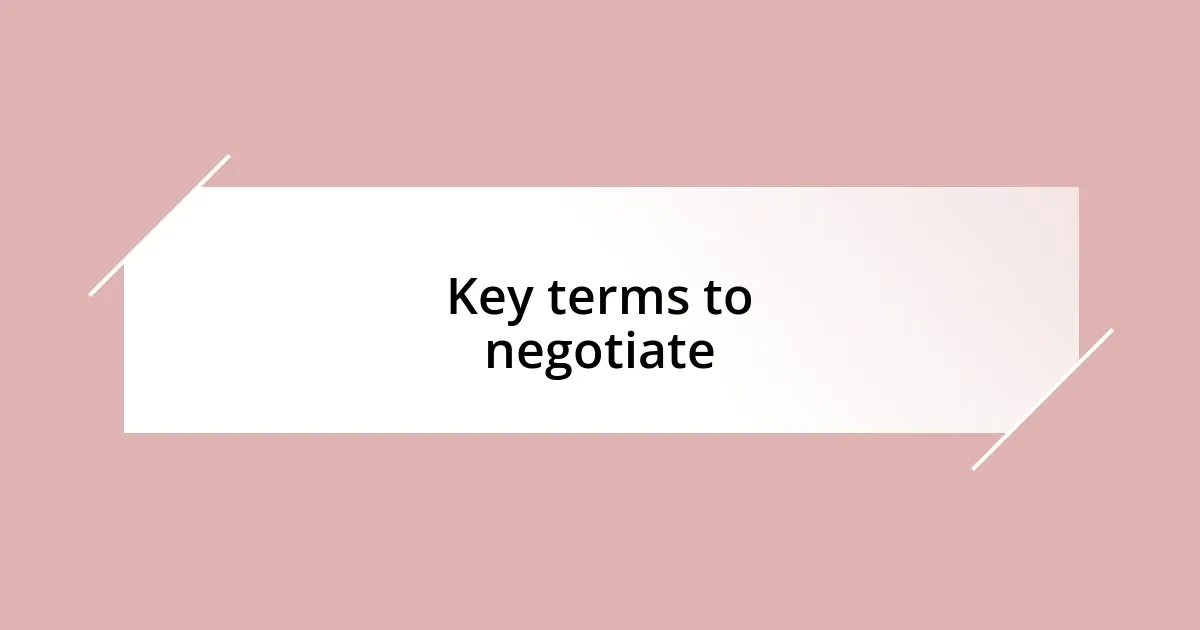
Key terms to negotiate
When diving into venue contracts, it’s vital to pinpoint the key terms you want to negotiate. From my experience, the cost of the venue is obviously a big one, but don’t overlook the additional fees that can pile up. For one contract, I discovered a hidden service fee tucked away in the fine print. It felt like a gut punch when I found out! By asking questions upfront, I managed to keep that charge off the table.
Here are a few key terms to prioritize in your negotiations:
- Total Cost: Ensure you get a clear understanding of both the base amount and any additional fees.
- Cancellation Policy: Negotiate terms that allow for flexible rescheduling or deposits that can be returned.
- Guest Count Adjustments: Clarify penalties for reducing or increasing your guest count.
- Setup and Breakdown Times: Ensure adequate time is allocated to set up before the event and clean up afterward.
- Payment Schedule: Try to negotiate a timeline that works best for your cash flow, rather than being locked into a strict schedule.
As I navigated my most recent venue contract, the responsiveness of the venue manager also came into play. Their willingness to communicate openly was refreshing and made me feel valued. It really cements a partnership vibe rather than just a transactional relationship. I realized that a venue’s attitude towards negotiations can set the tone for the entire event planning process.
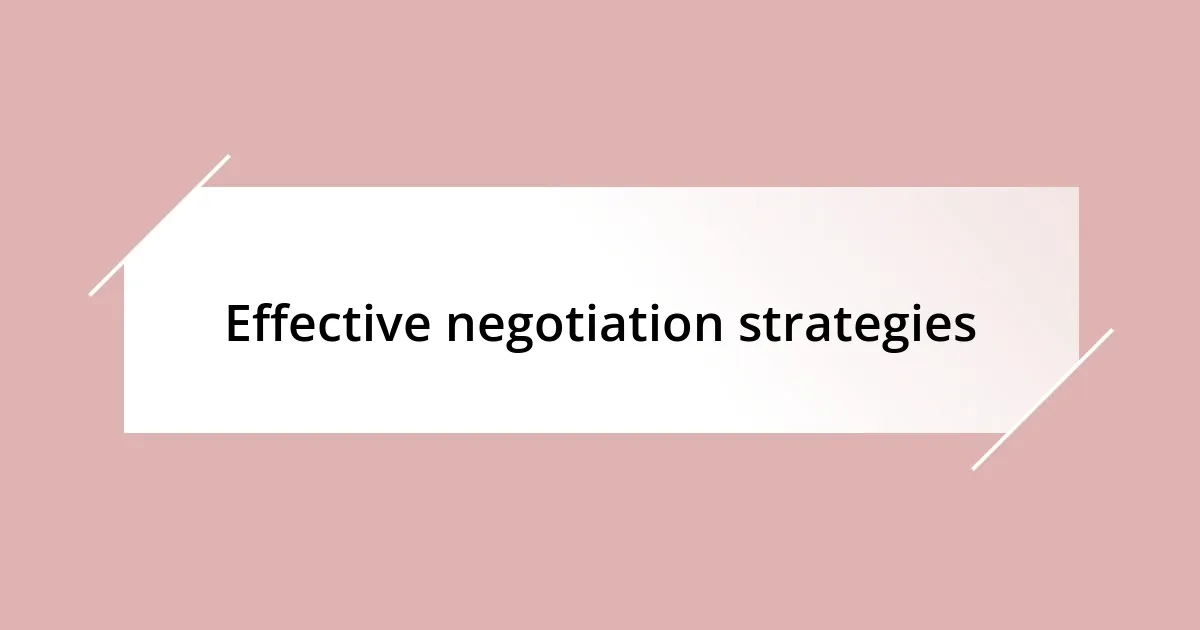
Effective negotiation strategies
I’ve found that the key to effective negotiation is establishing rapport with the other party. On one occasion, I made a casual comment about the venue’s beautiful decor, and it surprisingly opened the door for a more laid-back conversation. It made me feel more like a partner rather than just a buyer—didn’t we all want the same outcome? This connection can shift the dynamic, allowing both sides to approach the discussion with mutual respect.
Another strategy that really worked for me was leveraging industry knowledge. When I mentioned that I was aware of seasonal demand fluctuations for venue bookings, I noticed the venue manager became more forthcoming. It prompted them to offer alternatives I hadn’t considered, like off-peak discounts. Being informed not only strengthens your position but also shows that you’re serious about the negotiation, which can encourage the other party to fear losing a deal.
Lastly, patience is often underestimated during negotiations. I remember feeling the urge to settle quickly after a few hours of back-and-forth discussions. Instead, I took a breath and asked for time to think it over. That break not only gave me clarity but also allowed the venue to reach back with a more favorable offer. Isn’t it intriguing how sometimes, stepping back can actually lead you two steps forward?
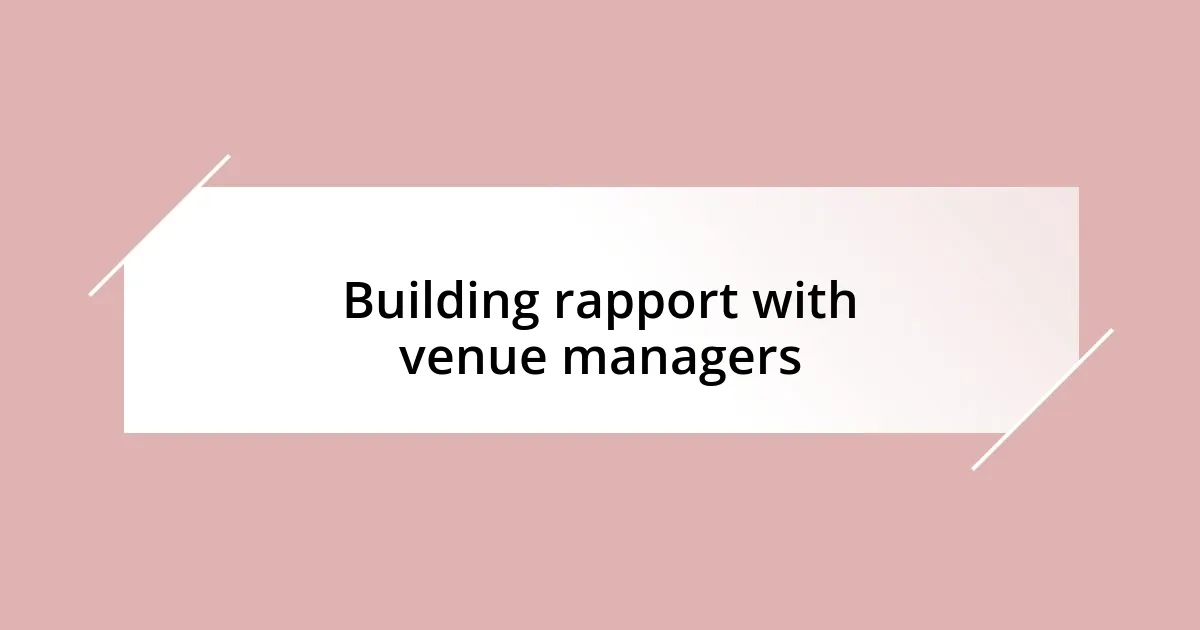
Building rapport with venue managers
Building rapport with venue managers is crucial. I recall my first experience negotiating a venue contract; it was nerve-wracking, but one small gesture helped me immensely. When I took a moment to share a genuine compliment about the venue’s ambiance, I could see the manager’s demeanor soften. It’s all about establishing a connection — what could be better than breaking the ice right from the start?
During my most recent negotiations, I made it a point to share a bit of my vision for the event. By explaining why I chose their venue and how it fits into my overall dream, I found the venue manager became more engaged. Have you ever noticed how people respond when they feel personally invested? I think it transforms the dynamic into more of a collaborative effort. It almost feels like we’re on the same team, working towards a common goal — making the event a success.
Moreover, showing genuine interest in the manager’s experiences and challenges created an incredible bond. I asked about their favorite events they had hosted in the past, which not only got them talking but also allowed me to glean valuable insights. Isn’t it fascinating how a simple conversation can unlock a treasure trove of information that goes beyond just negotiating terms? This rapport-building process can lead to better deals simply because both parties feel respected and valued.
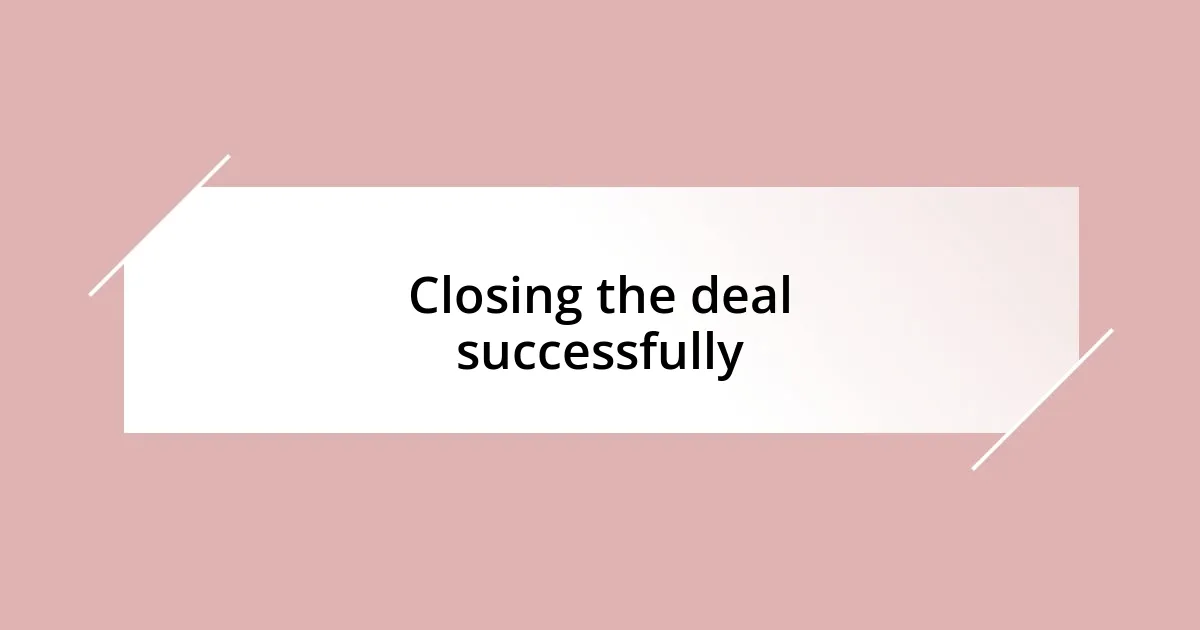
Closing the deal successfully
Successfully closing a deal often hinges on timing and clarity. I recall a moment when everything seemed to align perfectly; the venue had offered an enticing package, but I felt an urge to put my thoughts into words clearly. So, before signing, I took a moment to restate the key points—this ensured we were both on the same page. Have you ever signed a contract only to realize later there was a misunderstood detail? By clarifying everything upfront, I felt more confident that we were both committed to the agreement.
One of the most valuable lessons comes from a situation where I hesitated at the final moment. After weeks of back-and-forth, the venue manager suddenly presented a revised quote that caught me off guard. Rather than jumping at the offer out of excitement, I paused to evaluate precisely how it fit within my budget. This careful contemplation led me to propose a slightly adjusted payment plan, which they surprisingly accepted! It’s amazing how moments of hesitation can often lend themselves to meaningful negotiation outcomes.
Finally, I find that sealing the deal is about mutual respect and understanding. During one of my negotiations, I had a final discussion about the cancellation policy, which can often be a sticking point. Instead of merely accepting their terms, I expressed my concern about unexpected situations that might arise. To my delight, the manager responded with flexibility, showing they valued my perspective. It reminded me that negotiations are as much about the relationship as they are about the numbers. How often do we overlook that simple fact?
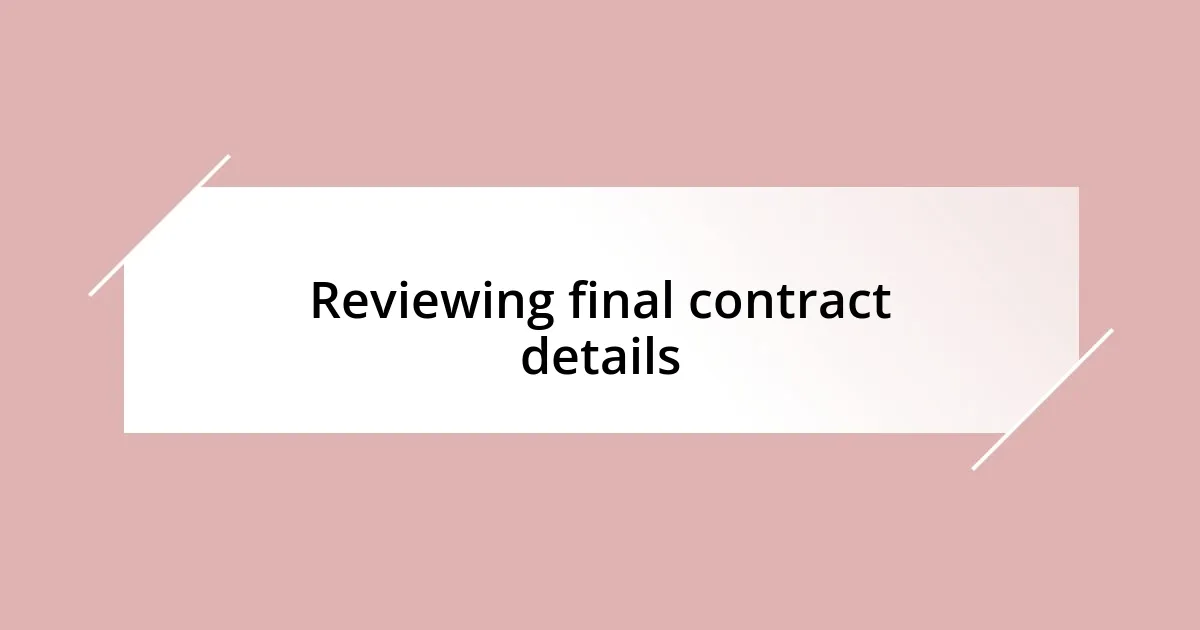
Reviewing final contract details
Reviewing final contract details can feel overwhelming, especially after a long negotiation process. I remember one instance where I thought I had everything sorted out, only to discover a key detail about the venue’s policy on audiovisual equipment rental that hadn’t been addressed. Have you ever overlooked something that seemed minor, only to have it escalate later? I had to take a deep breath and request a meeting to clarify my concerns directly, which ultimately saved me from potential frustration down the line.
As I sat down with the final contract, I made it a point to read it thoroughly, word by word. I felt a wave of anxiety as I lingered on the terms related to deposits and payment structures. This wasn’t just a document; it was a commitment. I learned to highlight any clauses that could pose issues later, like cancellation policies or penalties for changes to the guest count. I think this meticulousness reflects how serious we are about managing potential risks.
I also discovered that discussing these details with the venue manager at this stage can foster a collaborative spirit. For instance, I opened up about my concerns regarding potential weather issues affecting an outdoor event. Instead of simply pointing to the contract language, I mentioned the emotional impact of such disruptions. This not only clarified my needs but also encouraged the manager to consider flexible solutions that aligned with my vision. Hasn’t it always been enlightening to see a contract transform from a mere agreement into a mutual understanding?








